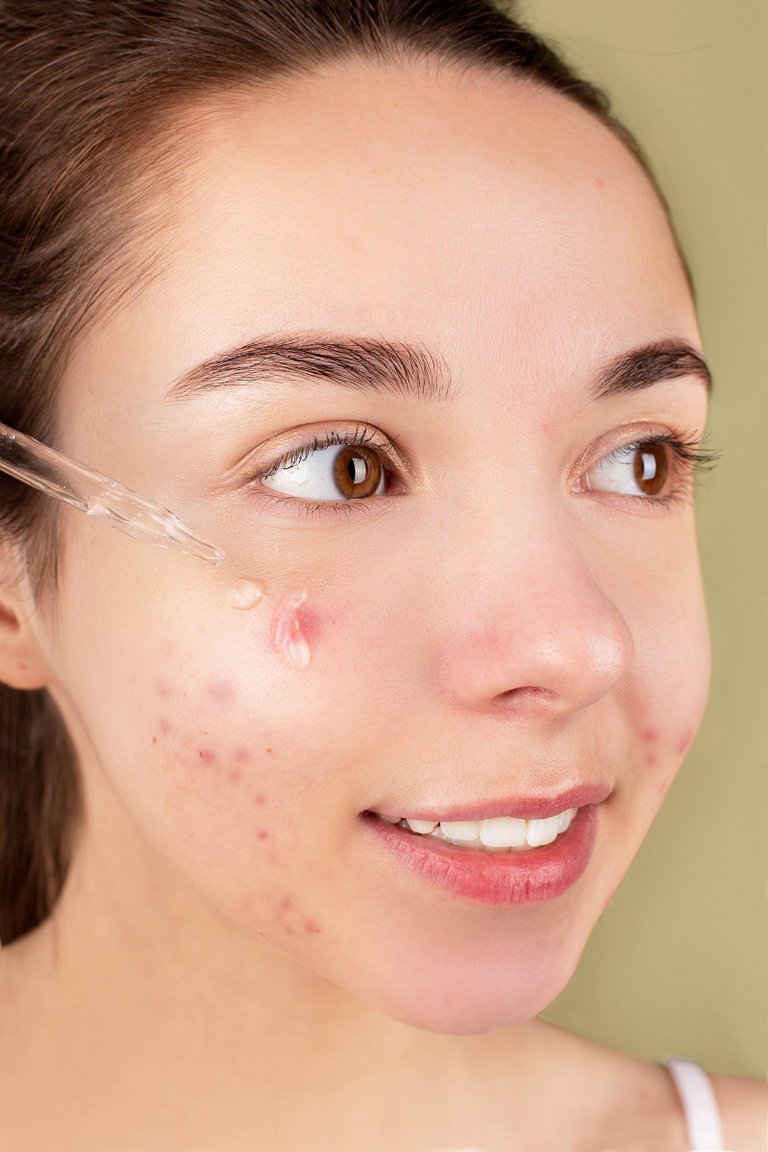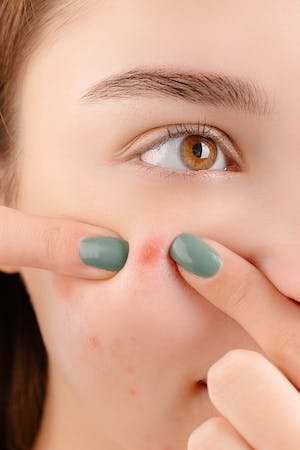The Dangers of Plaque Psoriasis
My choice to explore diseases that have no current cure is a result of a certain story of a woman who was diagnosed with an ailment without disease, she's quite popular so the news went really viral and I came here to write on the disease but after discovering that, there are other diseases that actually exist up till date without a cure, I decided to do deeper research on the topic.
When I heard about Psoriasis a few weeks ago, I could not even imagine what it meant, it sounded really strange to me, and of course, I decided to do my own research on the topic and of course, share the knowledge gained with beautiful people over here.

pexels
Psoriasis is a complex, multifunctional, and chronic inflammatory disease involving hyperproliferation of the keratinocytes in the epidermis contributed by an increase in the rate of epidermal turnover. 1 Let's analyze it in a more clear form.
Psoriasis is actually common (funny enough), it is a skin disease that causes an itchy type of rashes, it also comes with scaly patches, usually around the knees, the elbows, the scalp, and even the trunk. It is a chronic long-term disease that could be a really painful experience that does not have a cure, the pain gets so severe that it interferes with sleep periods making it difficult for concentration to be achieved. The condition goes through different stages, it flares for a few weeks or months, and after this process, it subsides for some time. 2 Normal skin cells would grow and fall off completely, usually within the space of one month, but with psoriasis, skin cells would only fall off within the space of three to four days.
The inflammation caused by psoriasis could affect other tissues and organs in the body, creating the possibility of developing other health conditions. A few cases of psoriasis also lead to psoriatic arthritis, the signs of PsA are; stiffness, swelling, joint pain, and even pain in areas surrounding the joints. When PSA is not treated early, it could lead to permanent joint damage.
Psoriasis can appear on any part of the body, even on the eyelids, lips, nails, skin folds, ears, and even hands. The plaques created could either come in the form of a few small patches or come in very large portions.
Psoriasis comes in different forms, a quick check on the different locations where psoriasis exists wouldn't be a bad idea.
Location for Psoriasis.
Genital Psoriasis: This is a very common type of psoriasis, it can affect the skin and the genital regions, including the inner and the upper thigs. Since this type of psoriasis is common in sensitive regions, special care is required but this is not to say it is not a manageable condition. Genital psoriasis can affect them;
- Vulva, penis or the scotum.
- The inner and upper thighs.
- The crease between the thigh and the genital region.
- The crease between the buttocks.
- The pubis.
Two major forms of psoriasis that can be experienced in the genital regions are; Inverse psoriasis and Plaque psoriasis.
Inverse psoriasis occurs in body folds such as the underarm, underneath the breast, and even the genital areas, the symptoms of inverse psoriasis is a smooth, red skin that may look tight and not scaly. Inverse psoriasis comes with; pain discomfort, constant/serious itching, and skin splitting. The situation could get worse by constant sweats and rubbing the body folds region.
Plaque psoriasis, on the other hand, occurs on the scalp, the elbows, knees, genitals, and even the torso. Some people would experience pain, discomfort, pain, and cracking of the skin.
Even if the treatment for genital psoriasis is difficult to treat, it is not impossible, a wide range of options are available, and working with a dermatologist would help develop an accurate treatment plan that will help you manage the condition. 3
Scalp Psoriasis: Scalp psoriasis just like the name implies, occurs on the scalp, it may be itchy, flaky, and awkward to treat. It gets even more complex when the scalp psoriasis gets blocked by the hair. Living with scalp psoriasis does not mean hair would not grow since there are ways to make living with scalp psoriasis much easier. 4

pexels
Facial Psoriasis: Facial psoriasis usually affects a reasonable amount of those with existing psoriasis, it could affect the eyebrow, the skin, the space between the nose and upper lip, the forehead, and even the skin, no part of the face region is left out.
Hands, Feet, and Nails Psoriasis: Having this disease in this location could impair the use of the hands and feet, therefore affecting the quality of life. Nail psoriasis usually affects more of the fingernail than the toenail. The feeling of pain and tenderness coming from nail psoriasis could affect daily activities. The common nail problems are;
- Nail thickening.
- Shallow or deep nails forming in the nail (pitting).
- Unusual nail color (Discoloration).
- Separating the nail from the nail bed (Onycholysis).
*Alteration in the normal nail shape (Deformation). 5
Skin Folds: Commonly found in the armpit, groin, under the breast region, and other skin folds.
After describing the most common location for psoriasis, there is a need to shed proper light on the types of psoriasis that exist as well.
Types of Psoriasis.
Plaque Psoriasis: This is the most common type of psoriasis that exist, this specific psoriasis type causes a dry, itchy skin type covered with scales. The treatment for psoriasis and psoriatic arthritis (PsA ) can be a complicated process, but with proper medical management, the disease can effectively be managed. The disease typically affects the back, knees, elbows, and scalp and severe cases of plaque psoriasis may affect the human body like; the genitals, feet, face, hands, and legs.
Plaque psoriasis is a problem with the immune system, the immune system overreacts and causes inflammation leading to a problem with the immune system, causing the immune system to overreact.
Plaque psoriasis can affect anyone regardless of the color or age, but it is more common amongst;
- White people.
- Those who take excessive alcohol.
- Have a relative who has psoriasis.
- Those who experience depression or extreme stress.
- Those who are obsessed.
- Taking infrequent medications.
- Those with previous family members.
- Those who smoke or use tobacco products. 6
Nail Psoriasis: This is an autoimmune disease that causes the skin to reproduce fast, this type of psoriasis affects the nails on the fingers and on the toes. Nail psoriasis can affect anyone regardless of age or gender, but there is a greater chance of developing nail psoriasis if you are;
- Over 40 years of age.
- Male gender.
- Family history of psoriasis.
The symptoms of nail psoriasis include; changes in nail structure, pitting, and discoloration. Nail psoriasis is not contagious. Ref
Guttate Psoriasis: This is a type of skin disease that appears without prior warning, following an infection like strep throat. Although the infection is common amongst young adults, it could happen to any adult. Symptoms of guttate psoriasis are;
- A round-shaped pink or red patches.
- Serious itching. Ref
Inverse Psoriasis: This is a disease form that makes it possible for skin cells to reproduce really quickly, this psoriasis occurs in regions where the skin rubs against itself. It is more common in the; groin, belly button, armpits, below the breast region.
Inverse psoriasis may appear really similar to Psoriasis, but psoriasis includes a thick, discolored patch of skin covered with white or silvery scales, the thick, scaly patches are called plaques, while inverse psoriasis does not include the thick, scaly plaques, this is most likely because it exists in moist regions of the body. Ref
Pustular Psoriasis: This type of psoriasis creates reddish, scaly bumps filled with pus. The pus-filled bumps are known as, pustules which can form on the skin, beneath the nail, and inside the mouth. When the pus gets dried, the area becomes red and glazed. 8
Erythrodermic Psoriasis: This is a rare chronic skin condition creating a red rash to form over most parts of the body, the rash usually looks like a burn and could be really dangerous requiring medical attention. Ref
Scientists have not been able to properly point out the possible cause of psoriasis, but it is clear that the immune system plays a strong role in making the disease obvious and clear. There are things that however trigger the effect of psoriasis;
- Stress.
- Skin injury.
- Sickness.
- Dry skin.
- Sun damage
- Weather condition. Ref
You need to see a medical expert the moment you notice;
- A widespread rash or skin discoloration.
- Anything on the skin causing pain and discomfort.
- Anything that makes you feel concerned about your skin.
- Any form of a rash that does not get better with simple skin care treatment.
In order to properly figure out the presence of plaque psoriasis, medical experts will have to carry out the following tests; - Allergy tests.
- Biopsy.
- Blood tests to determine the cause of the rash since there are other things that can cause rash rather than psoriasis.
There are certain drinks and food that could flare up, plaque psoriasis. Once you are diagnosed with the condition, it would be a good idea to stay away from certain food and drink. Basically, foods that contain anti-inflammatory properties would cause flare-ups,
- Olive oil.
- Oily fish.
- Leafy greens.
- Dairy which includes cow's milk and egg.
- Gluten.
Is there a way to prevent, plaque psoriasis?
Plaque psoriasis can actually not be prevented, if you have the disease, it may come and go throughout a lifetime, treatments could however help reduce symptoms even for people who have severe plaque psoriasis.
Conclusion.
Plaque psoriasis is a disease that cannot be cured but of course can be managed appropriately with the right medical team putting appropriate advice to make the patient feel better, so it is not often an immediate death sentence as long as it is appropriately managed. The moment you notice a rash that would not go away with normal skin care routine, it is necesary to visit a medical expert instantly.
For further studies.
Cleveland Clinic - Erythrodermic Psoriasis

Hi, I am Tobi a writer, speaker, relationship blogger, and lover of good music. I love making friends and learning from people. Want to hear me speak on relationships and general life issues, you can find my podcast channel Here and I also have a youtube channel where you can listen and watch any episode for free, do not forget to subscribe and share with friends. I sincerely appreciate every love I get from members of the community and do well to keep them coming.
Thanks for your contribution to the STEMsocial community. Feel free to join us on discord to get to know the rest of us!
Please consider delegating to the @stemsocial account (85% of the curation rewards are returned).
You may also include @stemsocial as a beneficiary of the rewards of this post to get a stronger support.
That's an annoying disease. I didn't know about it.
I am curious. Do you know anyone who got it recently? Why did you choose to write on such a topic?
Cheers!
Not that I know someone who has got it, but I read about someone who has it, and then I started to read about several other experiences, really scary I must confess, then I decided to share.
Thanks for the side story. I think it would be something nice to add to the blog, rendering it more personal.
Have a nice evening!
Yay! 🤗
Your content has been boosted with Ecency Points, by @oluwatobiloba.
Use Ecency daily to boost your growth on platform!
Support Ecency
Vote for new Proposal
Delegate HP and earn more